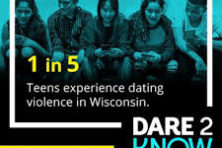Teen Dating Violence Awareness Month
- Share
- Tweet
- Pin
- Share
By Danielle Nyman, Domestic Violence Coordinator/Youth Advocate, HELP of Door County, Inc.
The term domestic violence is often correlated with the image of a white woman in her early 30s with a black eye. Yes, this image reflects some victims of domestic violence, but it also excludes a large proportion of others. Men are victims. Black, First Nations, Latin and Southeast Asian individuals experience domestic violence. Individuals who identify as LGBTQ are victims, as well as individuals with a disability. Economic status does not matter, and neither does age.
In fact the highest rate of domestic violence is found with girls and young women between the ages of 16 and 24. According to loveisrespect.org, domestic violence among this demographic is triple the national average. Triple the national average, yet teenagers are often overlooked in the conversation surrounding domestic violence. Most parents are unaware that teen dating violence is an issue or what the signs are.
Many believe domestic violence is just physical, but it’s not. It includes emotional, financial, sexual and verbal violence as well. Individuals may play mind games and call their partners names. They often begin to isolate their partners using jealousy and control tactics. Some may sabotage their partners’ jobs or control their finances. Often individuals lose control and get angry over minor details. Typically they will not take accountability for their actions, blaming their partner instead. The key component of a domestic violence relationship is one partner exerting power and control over the other.
As partners exert power and control, a low sense of self worth begins to develop, along with feelings of shame and guilt. As a friend or loved one of someone experiencing domestic violence, it is important to be supportive and non-judgmental. Focus on their safety, but let them make the decision to stay or leave the relationship. Those in a domestic violence relationship know their situation best, and often the most dangerous time is when they leave.
Supportive services are available through HELP of Door County, Inc. Advocates at HELP work with adults, elder adults, and youth experiencing domestic violence, as well as friends and family. For more information on HELP’s services or how to best support a loved one, please contact the 24/7 domestic abuse hotline at 920.743.8818.
This article is brought to you in part by the Door County Coordinated Community Response (CCR) to Domestic Violence and Sexual Assault Teams and the Door County Elder and Adult-at-Risk Interdisciplinary Team.


